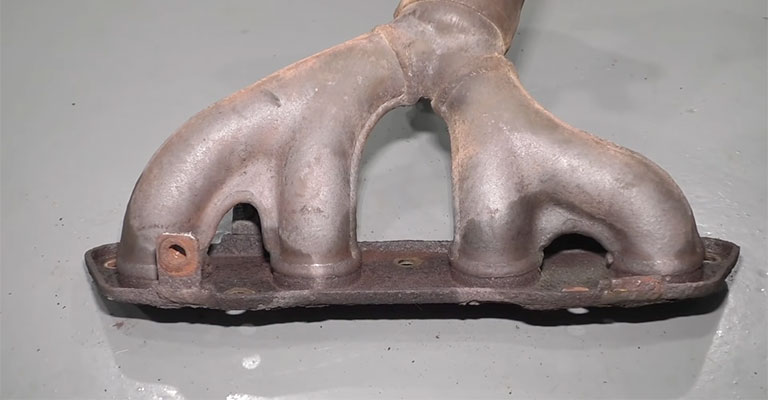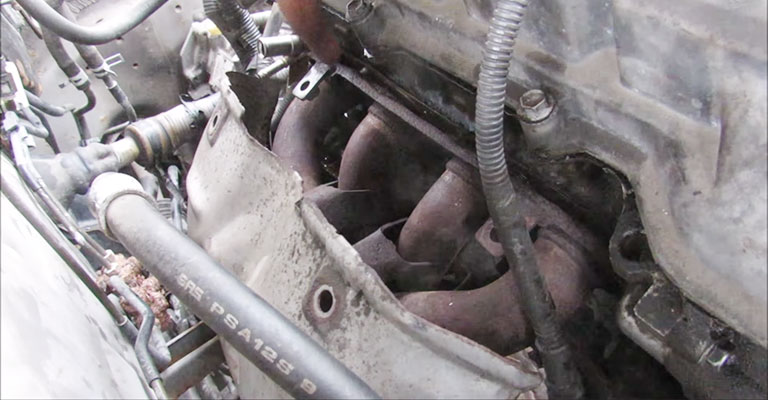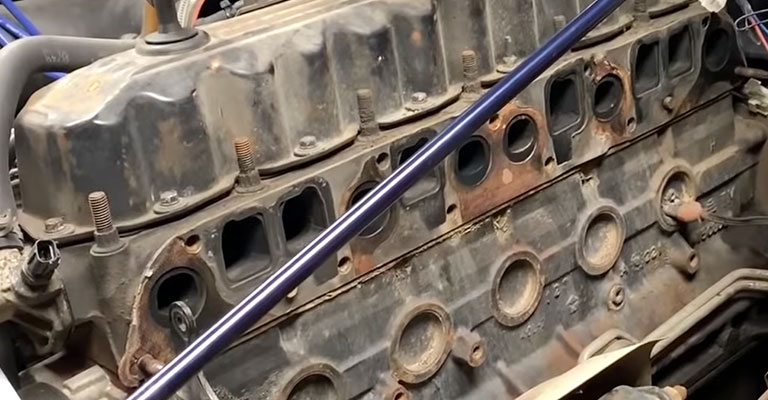You can drive with a leaking exhaust manifold. However, you cannot afford to continue driving if you start smelling gases and hear a loud noise from the engine. That is a red alarm coming from your car indicating that you should repair the leakage as soon as possible.
When you see such signs, you can affirm that there is a leakage in the exhaust. Any leak in the exhaust means that the gases could return to the car instead of leaving it. To prevent further damage, you should stop running the engine and open the windows to let clean air in.

Can You Drive With a Leaking Exhaust Manifold?
From a practical perspective, you can drive your car with a leaky manifold. However, it is highly inadvisable to do so. You will be signing your own death warrant if you insist on driving in such a condition.
If you own a car that is old enough, you can drive without an exhaust manifold with no problem. But for newer models, a leaky exhaust manifold will expose the inside compartment of the car to exhaust gases that will most certainly cause a health hazard for you and the passengers.
Upon detecting a 5 mm diameter hole in your exhaust manifold, you should excuse yourself from driving at the moment’s notice. The resultant carbon monoxide will be entering the passenger compartment and you will need an ear defender to withstand the blaring noise.
Moreover, a leak in the exhaust manifold changes the pressure in the exhaust system. As a result, it will have a bad effect on the electronics downstream as well. This can also lead to additional problems such as catalytic converter failure.
Although if the leak is minor and the noise is minimal, you can get by without rushing to fix it. In the meantime, you must not sit in the car with the engine running. Also, keep the windows open at all times to prevent getting poisoned. Later, consult a mechanic to address the issue as soon as possible.
The function of an Exhaust Manifold

The exhaust system is what is responsible to deal with the harmful gases coming out of the combustion chamber. It also muffles the noises that come with high speeds and continuous explosions in the combustion chamber. After cooling the toxic gases down, it cleans them and pushes the gases out through the exhaust pipe.
A leak in the exhaust manifold is dangerous and toxic gases could leak into the compartment instead of getting dispersed out of your car. As a result, it is not just your health that would be at risk, the car’s performance will be compromised as well.
Signs of an Exhaust Manifold Leaking
It is easy to catch the leak in the exhaust manifold. However, the challenging part is determining the exact location of the leak. The first sign of the leak would be the abnormal noises coming from the engine. You may also notice a strange smell coming from under the hood.
Poor fuel economy and a reduction of acceleration power are also some of the major signs of an exhaust manifold failure. Besides, a leak in your exhaust system may trigger the sensors which will cause the check engine light to turn on.
How Long Can You Drive With a Leaking Exhaust Manifold

It depends on how far the place of repair is. Driving it beyond that is not safe or legal if you are smelling something burning. That is because an exhaust manifold leak can be disastrous. Once you spot one, you must immediately drive it to get it serviced and open the windows to let the toxic gases out.
You would probably want to have a good look at the manifold and make sure nothing is touching it after it was repaired the last time. It is not rare to see vehicles with crappy exhaust manifolds and bolts. In that case, the repair cost becomes meaningless and it is better to get yourself another car.
What Happens If You Don’t Fix an Exhaust Manifold Leak
An untreated exhaust manifold leak could potentially damage your vehicle’s engine. To illustrate this, a leaking exhaust manifold gasket might cause the exhaust valves to burn up. As a result, the exhaust products might stream back into the intake manifold.
Moreover, it could lead to the failure of the catalytic converter and cause the engine to run rich. The excess air entering the exhaust system will cause the O2 sensor to detect it and add extra fuel. This will cause the exhaust to contain unburnt fuel. As a result, the efficiency of the catalytic converter will reduce.
How Serious is an Exhaust Manifold Leak

An exhaust manifold leak is not an issue to leave for later. It poses a great threat to your engine if it is not taken care of timely. A faulty manifold lets additional heat enter the engine and damages the catalytic converter. Besides, a catalytic converter is quite costly to replace.
Other than that, an exhaust manifold leak causes toxic gas such as carbon monoxide to enter the cabin. It reduces gas mileage and requires you to refill the petrol tank more often as the engine is forced to push extra.
Frequently Asked Questions
Can an exhaust manifold leak hurt the engine?
An exhaust manifold leak can definitely hurt the engine. When the leak takes place, the system becomes powerless to draw the excess heat away from the engine. That heat burns the exhaust valves and restricts the exit of the exhaust gases.
How can I temporarily fix an exhaust manifold leak?
You can temporarily fix the exhaust manifold gasket leak by using adhesives. Some of the popular adhesives include J-B Weld, Gorilla tape, and scotch electrical tape. Another option is to use a welder to weld an exhaust clamp around the leak.
Will a cracked exhaust manifold affect performance?
A cracked exhaust manifold will certainly affect performance. It reduces the acceleration power. Moreover, it will cause a loss of back pressure which in turn affects the engine performance.
Conclusion
A leak in the exhaust manifold should be repaired promptly. Prolonging this issue could pose threat to your health as well as negatively affect your car’s overall performance. Fixing the exhaust manifold leak yourself can save you a hefty sum. However, if you don’t have the necessary experience, it is best to leave the problem to the professionals.
Leave a Reply